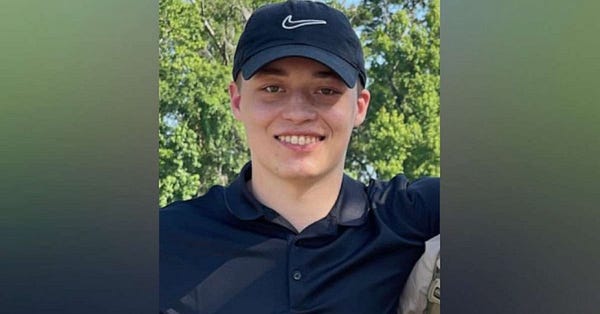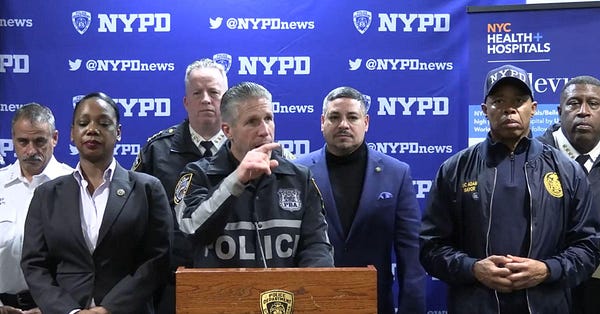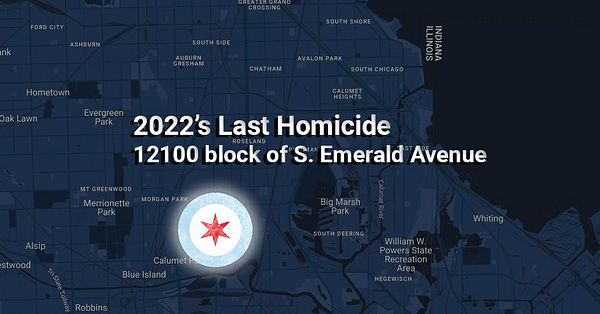Turning The Calendar Over To More Of The Same
The question of whether crime is again becoming a serious issue in this country remains both open and controversial into the new year, to say the least.
I hope you all had yourselves a merry Christmas and a happy New Year. I can’t remember the last time I didn’t say this about the new year, but I’ll say it again: I can’t believe it’s 2023. I remember when the year 2020 felt so far in the future, then 2020 arrived with all its associated craziness. Now here we are, three years into the decade, which we can no longer refer to as the “new decade.” This blog is now over a year old. The Biden administration is entering its third year in power. And, in a few months, the Russian invasion of Ukraine will pass the one-year mark.
How did all this time go by? There’s something to be said about slowing yourself down, because the world doesn’t slow down for you!
As I hope you all entered 2023 on a high note, I see that it began on a very inauspicious note around the country. Look at what happened in New York as the calendar turned from 2022 to 2023:

Arguably, the most shocking incident of the night was a stabbing of two police officers at Times Square, where America’s biggest New Year’s Eve celebration takes place:

The accused stabber, 19-year-old Trevor Bickford, was shot, but survived and was taken into custody. Thankfully, the two officers who were stabbed have since been released from the hospital.


Afterwards, a major twist in the story emerged:


How many times have we heard this story? A suspect commits a crime, then it turns out federal law enforcement was aware of the person and their potential to be a problem. I get law enforcement agencies cannot never violate someone’s rights, but it’s getting tiring hearing that the FBI was aware someone presented a danger, but nothing could be done about it. Meanwhile, agencies like the FBI are being re-oriented towards going after Americans who harbor dissenting political views, but it’s obvious the Islamist threat never really went away.
Then there’s Chicago, one of America’s most dangerous cities, arguably the most dangerous among the top 10 biggest cities in the country:


The next morning, the first of the year:


The question of whether crime is again becoming a serious issue in this country remains both open and controversial into the new year, to say the least. Simply noticing that crime is happening often invites a firestorm of vitriol, as if you’ve violated some sacred cultural norm. It’s going to take a lot more data and research to decide one way or the other, but part of the problem is that a lot of the data simply isn’t available. The FBI has yet to release its 2021 crime statistics, making it doubtful 2022 numbers will be released as well.
One study does paint a nuanced, yet troubling picture of crime trends in the country. As reported by The Washington Times:
Homicide rates dipped in 2022, but violent crimes such as rape, robbery and assault remained dramatically higher than before the COVID-19 pandemic, The Washington Times found in a review of data from police departments across the country.
Through the final week of December, violent crime in Chicago soared 41% from the same period a year earlier, though homicides declined 14%. In New York City, overall violent crime increased by 23% from 2021 but homicides dropped by 13%. Violent crime in Los Angeles jumped 8% while homicides dropped by roughly 6%.
Studies by police and law enforcement organizations reached similar conclusions.
The Council on Criminal Justice’s midyear 2022 crime report, released in September, found that the homicide rate in 29 U.S. cities dipped by 2% through the first six months of the year from the same period in 2021. Aggravated assaults and robberies increased by 4% and 19%, respectively.
A Major Cities Chiefs Association survey of 70 U.S. law enforcement agencies found that homicides dropped by 2% through the first six months of 2022 but violent crime increased by 4.4%. Robberies were up by 13%, and aggravated assaults increased by 3%.
Fewer people are getting killed, but people are being harmed and robbed to a much higher degree than before. Those who believe concern over crime is merely a right-wing moral panic often cite homicide statistics, mentioning how low they are compared to the dizzying heights of the early 1990s.
But as I’ve also explained in the past, the days of “crime at historic lows” are now several years gone. Year-over-year numbers matter, but not as much as the overall trend:
Looking at the 20-year trend, you can see that violent crime has indeed come down significantly. But since hitting an all-time low in 2014, the trend is clearly oriented upward. We’re pretty much back to where we were in 2010 and the all-time low lasted only a couple years. Once again, it doesn’t help that the FBI has yet to release 2021 statistics, consequently leaving it up in the air as to whether 2022 numbers will be released.
The other problem with citing homicide statistics as a metric of peace and tranquility is that they’re just one of many different types of crimes, though arguably the worst. A few months back, I wrote about how France isn’t the first place that comes to mind when you think of a violent country, due to its relatively low homicide rate. However, it’s overall crime rate is higher than the U.S. How could this be? Aside from murders, all other crimes occur more frequently per capita than in the U.S.
The crime situation in France seems to be the way to describe the situation in the U.S., at least in 2022. Fewer people are getting killed, but people are being harmed and robbed to a higher degree than before. Yet even the Left isn’t entirely correct on homicides:
Ironically, in 2020, homicides surged to a level not seen since 1997, a span of 23 years. Again, we are well past the “historic low” era of crime. Even if homicides did come down in 2022, the important part of the story is that a new baseline has been established. To claim crime isn’t a problem because homicides came down (never mind all the other crimes going up, but put that aside for a moment) last year is like President Joe Biden bragging about gas prices coming back down to where they were pre-Russia’s invasion of Ukraine. It pretends gas prices weren’t already increasing before Russia crossed the border, thereby establishing a new baseline, meaning that gas prices are still higher than they were at the beginning of the Biden administration.
The point isn’t that higher gas prices are Biden’s fault. The point is that a new “normal” is being established and 2023 is likely to be a continuation of this new baseline. Crime is definitely not going back down, not any time soon. If the Regime really wants to wait until homicide rates are at early ‘90s levels before they admit there’s a problem, then crime is definitely going to get worse.
Of course, the Left has no problem letting us know there were more police shootings in 2022 than ever before. I have to admit, this caught me by surprise, but more on that in a second:

Up front, more police shootings = more crime. Unless you believe police never have a good reason to shoot someone unless they’re a mass shooter or right-wing extremist, the increase in police shootings is strong evidence there’s more violent crime going on out there. Two years removed from the death of George Floyd under police custody, the subsequent uprising, the “Defund the Police” movement, and the peak of Black Lives Matter, police have, if anything, an incentive to reduce police shootings. Typically, when public opinion turns against law enforcement, they resort to what’s called “Drive and Wave,” where they basically ignore anything except the most critical of emergencies. Those inclined to be hostile towards law enforcement hold this against them, but the fact is police need the consent of the governed. If the message on the part of the public is, “We don’t want you involved,” then the police are going to exercise their better judgment and avoid putting themselves in situations which may put them at odds with the public.
The fact that police shootings are higher than ever recorded reveals, despite their best efforts, cops are encountering more dangerous situations than before. Even if not every situation is a “good shoot,” ask yourself: are more shootings happening because cops are given greater license to use deadly force, or are they happening because they’re encountering more violent suspects out in the field? Your answer may depend on whether you view law enforcement as the bigger problem or crime as the bigger problem. My personal experience is that cops, at least in the last few years, want to deal with as little possible, which is both troublesome and not surprising. I also think the public still tends to underestimate how violent many criminals, including the unarmed, can actually be. I’ve written about it in the past and the sobering truth is that the quickest and most effective way of stopping them is either through injury or death.
I found this story surprising because you’d think, following the death of George Floyd and all the attention paid to police violence in the past decade, that the record number of police shootings in 2022 would’ve been a bigger story. But it wasn’t. My belief is that the events of 2020 shocked even the Regime and they do recognize, if not openly, that crime is a liability for them. By not talking about police shootings, it suppresses public outrage, not to mention most people are fed up with the drama and desire “normalcy” after the craziness of 2020. Furthermore, talking about police shootings would open themselves up to the counter-argument that crime is getting worse, a narrative the Regime has worked to squelch these last few years. Sometimes, it’s better just to not talk about hard issues. You don’t have to like it, but it’s a rational choice.
Will crime get better or worse in 2023? I believe it’ll get worse because, as I think I’ve convincingly argued, America is not a tranquil place. There’s a lot of anger, fear, and loathing out there, and there’s an increasingly sizeable class of people who engage in crime for no other reason than they feel entitled to. There’s also an increasing number of social predators; people who may not be criminals, per se, but for whom confrontation and violence is a way of life. The lack of national unity, political polarization, and increasing economic hardship portends major strife that’ll manifest itself first and foremost in crime. Finally, illegal immigration and the furthering reach of drug cartels dramatically raises the prospects for even greater and more threatening violence in this country.
As I’ve said before, crime can become a national security issue. We may not be there yet, but we’re well on the way.
Edward Chang is a defense, military, and foreign policy writer. Follow him on Twitter at @Edward_Chang_8.
If you liked this post from We're Not At the End, But You Can See It From Here, why not share? If you’re a first-time visitor, please consider subscribing!






